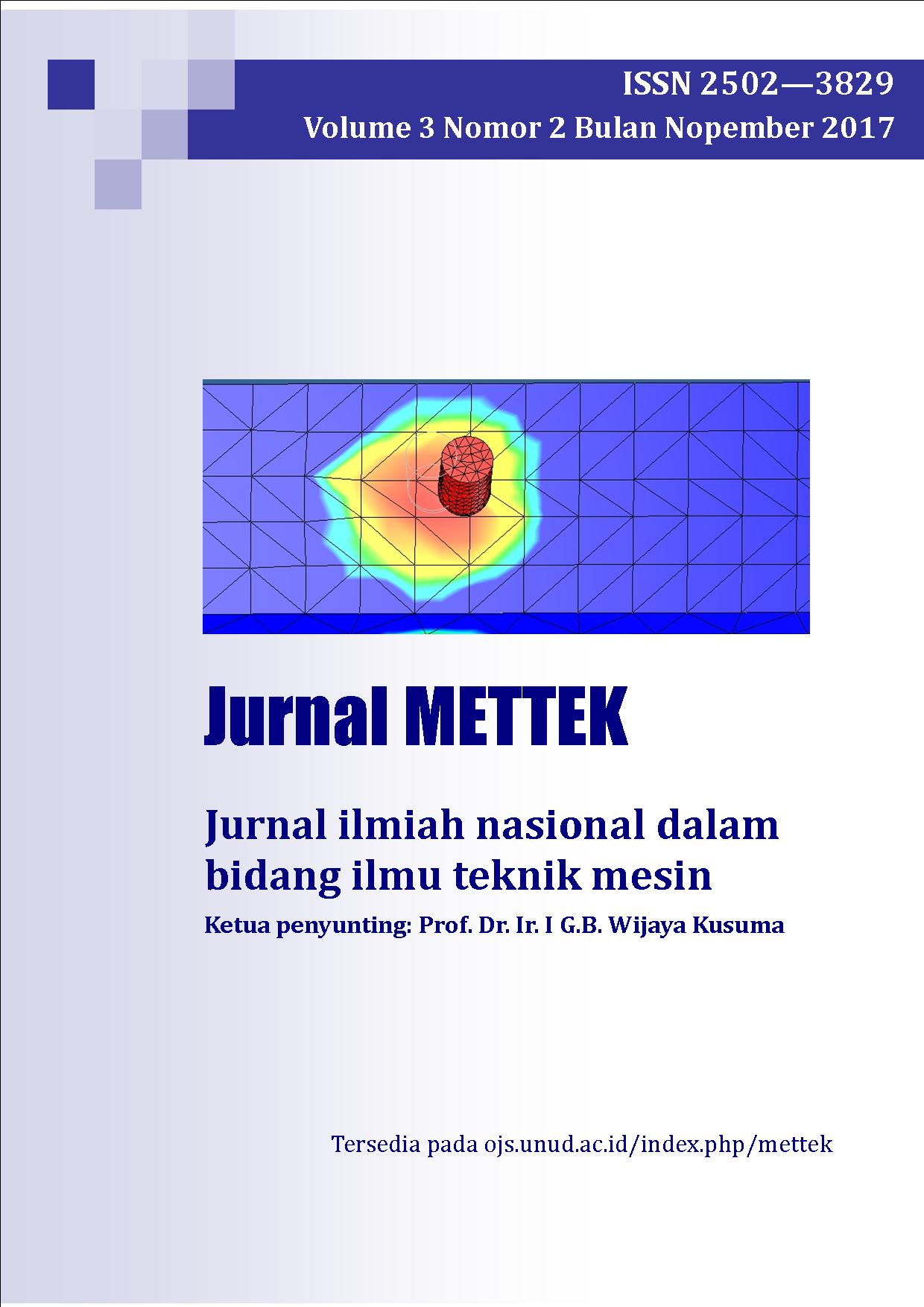Fenomena Transport Heat Exchanger Sistem Untai
Abstract
Heat exchanger sistem untai adalah suatu alat yang dibuat khusus untuk aliran satu-fasa dengan variabel diantaranya daya pemanas dan laju aliran fluida. Daya pemanas dalam untai berupa elemen pemanas air yang memiliki daya 1000 Watt. Heat exchanger sistem untai tersusun atas heater tank, cooling tank, dan pipa kaca (pyrex) yang membentuk sebuat siklus. Adapun fungsi dari masing-masing bagian yaitu, heater tank berfungsi sebagai media memanaskan alir dengan elemen pemanas hingga waktu yang telah ditentukan. Cooling tank berfungsi sebagai media mendinginkan air dimana pada cooling tank terdapat heat exchanger berupa coil and shell yang direndam dalam air atau kolam pendingin, di dalam heat exchanger fluida berupa air yang terlebih dahulu telah dipanaskan, air dipanaskan pada heater tank akan memberikan efek perubahan kerapatan fluida yang akan menyebabkan terjadinya pergerakan fluida yang disebabkan oleh efek buoyancy, yang tersusun atas pipa kaca dan membentuk sebuah siklus. Penelitian ini bertujuan untuk mengetahui kecepatan aliran fluida dalam heat exchanger sistem untai melalui simulasi ansys fluent dan menganalisa perpindahan kalor yang terjadi serta dapat mengetahui banyaknya kalor yang mampu dipertukarkan melalui metode perhitungan secara matematis. Dari hasil penelitian, analisa perhitungan, dan simulasi yang telah dilakukan dengan input running simulasi yaitu temperatur dan tekanan didapatkan output yaitu velocity aliran fluida sebesar 1,264 m/s. Adapun panas yang dapat dipertukarkan pada heater tank sebesar 2039,66 Watt dan hanya memiliki efektifitas sebesar 38%. Pada Cooling tank mampu mempertukarkan kalor sebesar11281,53 Watt dan memiliki efektifitas sebesar 84% serta jumlah heat transfer yang mampu disalurkan (NTU) sebesar 1,83.
Heat exchanger strand system is a tool made specifically for single-phase flow with variables including heating power and fluid flow rate. Heating power in the strand is a water heater element that has 1000 Watt power. Heat exchanger strand system is composed of heater tanks, cooling tanks, and glass pipes (pyrex) that form a cycle. The function of each section is, heater tank serves as a medium to heat the flow with the heating element until the time specified. Cooling tank serves as a cooling water medium where the cooling tanks contain heat exchanger in the form of coil and shell soaked in water or cooling pool, in a heat exchanger fluid in the form of water that has first been heated, water heated on the heater tank will give effect fluid density change which will lead to fluid movement caused by the buoyancy effect, which is composed of a glass pipe and form a cycle. This study aims to determine the speed of fluid flow in the heat exchanger strand system through simulation Ansys fluent and analyze the heat transfer that occurs and can know the amount of heat that can be exchanged through mathematical calculation method. From the results of research, calculation analysis, and simulations that have been done with input running simulation ie temperature and pressure obtained output velocity fluid flow of 1,264 m / s. The heat that can be exchanged on the heater tank of 2039.66 Watt and only has the effectiveness of 38%. In Cooling tanks capable of exchanging heat of 11281.53 Watt and has an effectiveness of 84% and the amount of heat transfer that can be channeled (NTU) of 1.83.
Downloads
References
Bergman, T. L. and F. P. Incropera (2011). Fundamentals of heat and mass transfer, John Wiley & Sons.
Bizzy, I. and R. Setiadi (2013). "Studi Perhitungan Alat Penukar Kalor Tipe Shell and Tube dengan Program Heat Transfer Research Inc.(HTRI)." Jurnal Rekayasa Mesin 13(1): 67-76.
Dibyo, Sukmanto, Mulya Juarsa, and Ign Djoko Irianto.”Analysis On Thermal Characterictic Of Heater In Loop FASSIP-01 Experimental Facility.”
Giarno, Prasetio, Djoko., Rachman, Agus Nur., 2017." Analisis Laju Aliran di Cooler Pada Heat Sink Sistem Untai Uji FASSIP". Sigma Epsilon-Buletin Ilmiah Teknologi Keselamatan Reaktor Nuklir. Vol.20
Juarsa, Mulya., Antariksawan, Anhar Riza."Penelitian Fenomena Perpindahan Panas Pendidihan Dalam Peristiwa Kecelakaan Rektor Nuklir Three Mile Island Unit 2." Sigma Epsilon, ISSN:0853-9103
Kusuma, M. H., et al. "Analisa Perpindahan Kalor Pendidihan Pada Vertical Reactangular Narrow GAP."
Kusuma, M. H., et al. (2017). "Investigation of the Thermal Performance of a Vertical Two-Phase Closed Thermosyphon as a Passive Cooling System for a Nuclear Reactor Spent Fuel Storage Pool." Nuclear Engineering and Technology 49(3): 476-483.
Kurnia, E., et al. (2016). "Karakteristika Perpindahan Panas Tabung Cooler Pada Fasilitas Simulasi Sistem Pasif Menggunakan Ansys." SIGMA EPSILON-Buletin Ilmiah Teknologi Keselamatan Reaktor Nuklir 19(2).

This work is licensed under a Creative Commons Attribution-NonCommercial-ShareAlike 4.0 International License.

This work is licensed under a Creative Commons Attribution-NonCommercial-ShareAlike 4.0 International License.







